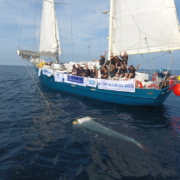22 Maart 2023
Brazilian geologists have found rocks comprised of plastic on an uninhabited island in the mid-Atlantic. The stones consist of an amalgamation of molten plastic with volcanic rock and sand. Some of the plastic originates from shipping. Located at more than 1,100 kilometres distance from the coast of Brazil, Trindade is one of the main breeding grounds of the green turtle in the world.
The researchers see in the material a manifestation of the Anthropocene, the new geological era in which humans are permanently affecting the earth, including geological formations.
ALARM BELLS HAVE BEEN RINGING FOR A DECADE
It has long been clear that plastic soup is not just about plastic waste in the oceans. In 2013, a new rock was described that consists of plastic fused with stone, coral or shells (plastiglomerate). These ‘stones’ had been found on a beach in Hawaii, where much plastic washes ashore, but also where many campfires are made. Subsequent studies found variants of these type of ‘stones’. Crusts of plastic were found on lava rocks on the coast of Madeira in 2016, growing larger every year (plasticrust). On the coast of south-west England, pieces of burnt plastic that look like pebbles washed up in 2019 (pyroplastics).
EARLIER MELTING DUE TO CLIMATE CHANGE?
Trindade is not inhabited by humans apart from a small naval base. Campfires as an explanation for plastic melting on this island can be ruled out. The plastic on the sand or volcanic rocks softens and melts under the heat of the sun. If this really is the case, it can expected that these plastic stones will be encountered in many more places in the coming years due to global temperature rise.
Photo: Rudolpho Buhrer (Reuters)
Plastic confronts scientists with new natural phenomenon
Plasticrust; coast with a plastic coating





